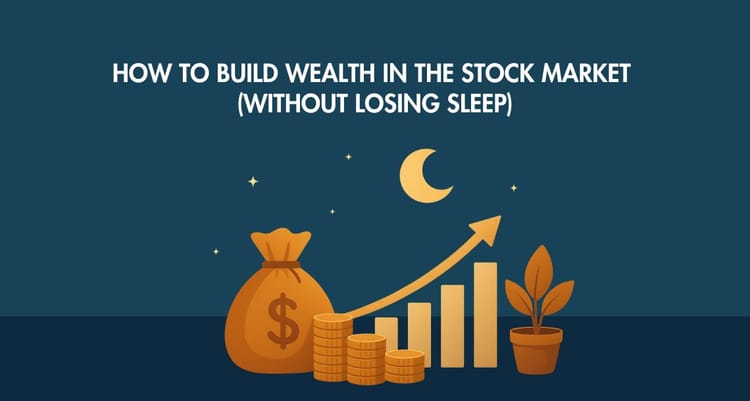Why Warren Buffett Loves Holding Stocks Forever

When the Oracle of Omaha speaks, the world listens. And one of Warren Buffett’s most iconic philosophies has stood the test of time:
“Our favorite holding period is forever.”
But what does he really mean by this? And why has this approach worked so well for one of the world’s most successful investors?
Buffett’s long-term investing mindset — and why patience might just be your most powerful portfolio tool.
1. Compounding Needs Time to Work Its Magic
Buffett often says, “Time is the friend of the wonderful business.”
The power of compounding isn’t about finding quick returns; it’s about staying invested long enough to let your money multiply.
Imagine this:
If you invest ₹1 lakh in a business that grows at 20% annually, in 10 years it becomes ₹6.19 lakh. In 20 years? A staggering ₹38.33 lakh!
Buffett knows that compounding isn’t fast, but it’s mighty — and it rewards those who wait.
2. Businesses, Not Stocks
Buffett doesn’t buy “stocks” — he buys businesses. He focuses on companies with:
- Consistent earnings
- Strong leadership
- Durable competitive advantage (what he calls a “moat”)
- Predictable growth
If you own a piece of a great business, why would you want to sell it?
He compares selling early to "cutting the flowers and watering the weeds."
3. Avoiding the Tax Trap
Another practical reason Buffett avoids frequent buying and selling is tax efficiency.
Every time you sell a stock, you potentially pay capital gains tax.
By holding long-term, Buffett defers taxes, allowing his money to stay invested and grow uninterrupted.
This is like giving compounding steroids.
4. Emotion Is the Enemy
The market is a rollercoaster — and emotions can destroy wealth faster than bad stock picks.
Buffett’s forever-hold mindset removes emotional decision-making.
He doesn’t react to market noise, headlines, or hype.
He sticks with his companies unless the fundamentals change dramatically.
This kind of emotional discipline has helped him avoid panic selling during crashes — and reap the rewards during recoveries.
5. Great Businesses Keep Giving
Buffett’s top holdings like Coca-Cola, Apple, and American Express have consistently paid dividends and increased in value over time.
These businesses generate ongoing cash flows, grow profits, and increase shareholder value — year after year.
Selling them early means walking away from a growing income stream.
He often says:
“If you aren’t willing to own a stock for 10 years, don’t even think about owning it for 10 minutes.”
What Can Indian Investors Learn?
Buffett's strategy may seem simple, but it’s not easy.
Here’s how you can apply it:
- Invest in businesses you understand
- Focus on long-term potential, not short-term trends
- Be patient — wealth is a marathon, not a sprint
- Use SIPs and stay consistent
- Let compounding do the heavy lifting
Buffett’s love for holding stocks “forever” is not about being passive — it's about being strategically patient.
In a world chasing quick profits, Buffett chooses wisdom, patience, and trust in great businesses.
And that’s what has built him a fortune worth billions.
As he rightly says:
"The stock market is designed to transfer money from the Active to the Patient."
FAQ
Q1. Why does Warren Buffett prefer to hold stocks forever?
A: Buffett believes in owning businesses, not just stocks. If a company has strong fundamentals, a durable competitive advantage, and consistent growth, he sees no reason to sell. Long-term holding also allows compounding to work its magic.
Q2. Isn’t it risky to hold a stock forever?
A: Buffett only holds stocks "forever" if the underlying business remains strong. If fundamentals deteriorate, he’s not afraid to sell. It’s not about blind loyalty—it's about conviction in quality businesses.
Q3. What’s the benefit of long-term holding over short-term trading?
A: Long-term holding avoids frequent transaction costs, reduces tax liabilities, and allows your investment to grow through compounding—something Buffett calls the "eighth wonder of the world."
Q4. How do I know which stocks are worth holding long-term?
A: Look for companies with strong financials, a competitive moat, trustworthy management, and consistent cash flow. Buffett focuses on simplicity and sustainability over hype.
Q5. Has this strategy always worked for Buffett?
A: While not every investment has been a home run, his portfolio winners—like Coca-Cola and Apple—have more than made up for the few that didn’t work. Patience and discipline are the key drivers of his success.
Q6. Is this strategy suitable for Indian investors too?
A: Absolutely. Indian investors can apply the same principle by identifying quality companies with strong fundamentals and sticking with them over the long run—through market ups and downs.






Member discussion